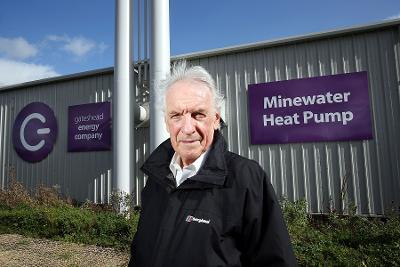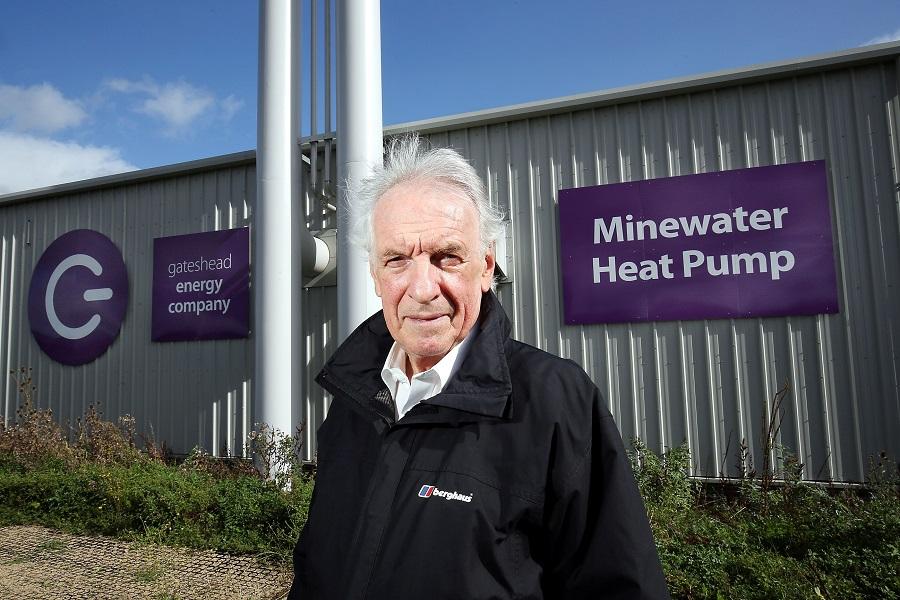Zero carbon power shows the way ahead

Gateshead is celebrating a successful first summer of heat and power generated from zero carbon, renewable sources.
Since May this year, the area's District Energy Network has been almost completely powered by renewable heat and power sources for all the needs of the network.
That means high profile buildings including the Glasshouse (formerly Sage Gateshead), BALTIC Centre for Contemporary Art and Gateshead College, as well as hundreds of high rise homes, are all benefiting from zero carbon power.
This has been possible thanks to the seamless integration of Gateshead Energy Company's newly installed urban solar parks with the UK's largest minewater heat pump system.
So on sunny or bright days this summer, we've been able to turn off our gas-fired Combined Heat and Power engines entirely.
Since May and throughout the summer, we turned the gas engines off during daylight hours, on 5 - 6 days per week.
This is a crucial step towards Gateshead's target for the entire network to be run on a net zero carbon basis by 2030.
The network currently supplies a total of 23 buildings, including three tower blocks with 350 homes.
The network is supplied with heat from mine water that is naturally heated to 15 degrees celsius at a depth of 150 metres below ground. When the water is pumped to the surface, we then extract the heat and boost it in our mine water heat pump building, to deliver water for the heat network at 80 degrees celsius.
On sunny or bright days, all the electricity needed to run the heat pumps can be generated by our solar parks, and there is enough surplus power to supply all the buildings on the network with all their other electricity needs too.
The 4 megawatt solar parks on Baltic Quarter and at Gateshead International Stadium cover land equivalent to around four football pitches.
Before the 6 megawatt mine water system came on stream earlier this year, the heat network was powered solely by our gas-fired Combined Heat and Power (CHP) engines, and they remain in place as an alternative heat and power source overnight and on dull days.
Councillor John McElroy, cabinet member for the environment and transport at Gateshead Council said "The Council has always seen the development of low-carbon energy as key to meeting our climate change goals, but also in generating lower-cost energy for residents and organisations in Gateshead.
"What we're seeing here is a green energy revolution, and all created from our fossil fuel legacy, on land where coal mines once stood.
"Thanks to the expertise of the Coal Authority, we can utilise the naturally heated mine water beneath our feet, then utilise solar generated electricity to boost that heat and deliver a zero carbon energy solution.
"We are proud this is the largest project of its kind in the UK."
Richard Bond, Innovation and Engagement Director at the Coal Authority, said: "We are proud to have been part of this revolutionary project working closely with Gateshead Council, which has led the way in providing a real working example of mine water heat, paving the way for other local authorities and organisations to create similar schemes.
"We believe there is a huge opportunity for Britain that can play a key part in meeting ambitious emissions reduction targets, and it's encouraging to know that these communities, which had such a big role in our industrial past, will be an important part of a greener future."
Now Gateshead Energy Company has completed several months of problem free operations, with the mine water heat pumps and solar PV parks working smoothly together, operating the heat network on a zero carbon basis will become the norm between May and September each year.
At other times in the year, the solar PV and minewater will still be reducing our reliance on gas.
Gateshead Energy Company is still committed to making its whole network zero carbon by 2030.
While we continue to work on the detail of how that will achieved, it's expected that sourcing even more renewable power - maybe from offsite wind, solar and other zero carbon sources elsewhere in the borough, or wider UK - will eventually allow GEC to turn off its gas engines completely by 2030.
Gateshead Council has operated the District Energy Network (DEN) since 2018 through the wholly owned Gateshead Energy Company (GEC).
The network provides 33% of heat, and 62% of power needs of all Council operational buildings (excluding schools).
GEC delivers this heat to customers at a price guaranteed to be at least 5% below market rates.
Gateshead Council has invested in these projects over the past three years, using the expertise of the Coal Authority and funding from the Department for Business Energy and Industrial Strategy (BEIS) - both the Heat Network Investment Programme, and the Public Sector Decarbonisation Scheme.
The heat network runs through 5.5km of pipes, and we have extensive plans to expand that network.
GEC is currently expanding the network further including 'The Sage', a new arena and conference centre, and to a new private housing development of 270 homes by developer Countryside Partnerships.
The Gateshead DEN already has the capacity to supply the energy needs of the equivalent of 5,000 homes.

Gateshead is celebrating a successful first summer of heat and power generated from zero carbon, renewable sources.
Since May this year, the area's District Energy Network has been almost completely powered by renewable heat and power sources for all the needs of the network.
That means high profile buildings including the Glasshouse (formerly Sage Gateshead), BALTIC Centre for Contemporary Art and Gateshead College, as well as hundreds of high rise homes, are all benefiting from zero carbon power.
This has been possible thanks to the seamless integration of Gateshead Energy Company's newly installed urban solar parks with the UK's largest minewater heat pump system.
So on sunny or bright days this summer, we've been able to turn off our gas-fired Combined Heat and Power engines entirely.
Since May and throughout the summer, we turned the gas engines off during daylight hours, on 5 - 6 days per week.
This is a crucial step towards Gateshead's target for the entire network to be run on a net zero carbon basis by 2030.
The network currently supplies a total of 23 buildings, including three tower blocks with 350 homes.
The network is supplied with heat from mine water that is naturally heated to 15 degrees celsius at a depth of 150 metres below ground. When the water is pumped to the surface, we then extract the heat and boost it in our mine water heat pump building, to deliver water for the heat network at 80 degrees celsius.
On sunny or bright days, all the electricity needed to run the heat pumps can be generated by our solar parks, and there is enough surplus power to supply all the buildings on the network with all their other electricity needs too.
The 4 megawatt solar parks on Baltic Quarter and at Gateshead International Stadium cover land equivalent to around four football pitches.
Before the 6 megawatt mine water system came on stream earlier this year, the heat network was powered solely by our gas-fired Combined Heat and Power (CHP) engines, and they remain in place as an alternative heat and power source overnight and on dull days.
Councillor John McElroy, cabinet member for the environment and transport at Gateshead Council said "The Council has always seen the development of low-carbon energy as key to meeting our climate change goals, but also in generating lower-cost energy for residents and organisations in Gateshead.
"What we're seeing here is a green energy revolution, and all created from our fossil fuel legacy, on land where coal mines once stood.
"Thanks to the expertise of the Coal Authority, we can utilise the naturally heated mine water beneath our feet, then utilise solar generated electricity to boost that heat and deliver a zero carbon energy solution.
"We are proud this is the largest project of its kind in the UK."
Richard Bond, Innovation and Engagement Director at the Coal Authority, said: "We are proud to have been part of this revolutionary project working closely with Gateshead Council, which has led the way in providing a real working example of mine water heat, paving the way for other local authorities and organisations to create similar schemes.
"We believe there is a huge opportunity for Britain that can play a key part in meeting ambitious emissions reduction targets, and it's encouraging to know that these communities, which had such a big role in our industrial past, will be an important part of a greener future."
Now Gateshead Energy Company has completed several months of problem free operations, with the mine water heat pumps and solar PV parks working smoothly together, operating the heat network on a zero carbon basis will become the norm between May and September each year.
At other times in the year, the solar PV and minewater will still be reducing our reliance on gas.
Gateshead Energy Company is still committed to making its whole network zero carbon by 2030.
While we continue to work on the detail of how that will achieved, it's expected that sourcing even more renewable power - maybe from offsite wind, solar and other zero carbon sources elsewhere in the borough, or wider UK - will eventually allow GEC to turn off its gas engines completely by 2030.
Gateshead Council has operated the District Energy Network (DEN) since 2018 through the wholly owned Gateshead Energy Company (GEC).
The network provides 33% of heat, and 62% of power needs of all Council operational buildings (excluding schools).
GEC delivers this heat to customers at a price guaranteed to be at least 5% below market rates.
Gateshead Council has invested in these projects over the past three years, using the expertise of the Coal Authority and funding from the Department for Business Energy and Industrial Strategy (BEIS) - both the Heat Network Investment Programme, and the Public Sector Decarbonisation Scheme.
The heat network runs through 5.5km of pipes, and we have extensive plans to expand that network.
GEC is currently expanding the network further including 'The Sage', a new arena and conference centre, and to a new private housing development of 270 homes by developer Countryside Partnerships.
The Gateshead DEN already has the capacity to supply the energy needs of the equivalent of 5,000 homes.
